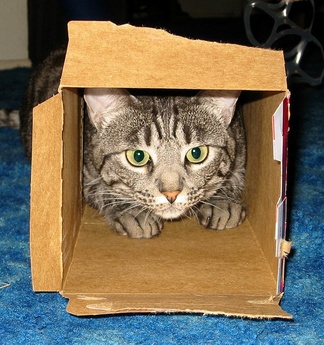Curbing a cat's early morning antics requires a firm, consistent approach

Flickr photo by admiller
Yes, I'm sure those of you — at least some of you — who share life with a cat can relate.
It can be a challenge to convey to our four-legged friends that the pre-dawn hours are not the time to begin the day. In fact, one of the most common questions that I get from cat owners is how to curb the behavior.
My household experiences this, but keeping Silver quiet until at least 6 a.m. can be done most mornings.
It's important to remember that cats are not on a human circadian rhythm — they're crepuscular. With that knowledge and some tips, keeping the peace can be a little easier. One word of caution: cats are great at trying to bend and break rules. Just be firm and consistent in your approach.
Occupy: Cat
Sometimes, it's just a matter of a cat having too much energy pent up. Having things for them to do during the day, like toys and games, and being sure that they are engaged in play with you (or perhaps a second cat) to help them get get adequate exercise is ideal.
Feed me
A common misstep that we make is thinking that a rambunctious kitty in the morning is likely a hungry one. Never, ever feed your cat to quell their enthusiasm while you try and catch a few more winks — you'll only create a new problem behavior. Once you feed them to keep the quiet, they'll expect it and the behavior will escalate.
Consider feeding your feline twice a day, and if your pet is especially active at bedtime, you might think about offering them some food right before bed. A full tummy might help them sleep.
I recommend not feeding a pet first thing in the morning. Consider holding off for just a little while before dishing up that morning meal. Hopping to it immediately reinforces in their mind the kind of behavior that they can expect from you — the one that they desire!
A little extra help
Some veterinarians recommend the use of melatonin to help encourage longer sleep. Talk to your clinician about using melatonin before giving it to your cat.
Don't give in
As tempting as it is to get up and react to your pet's demands, don't. Once you let to know them know that you're awake or that they've gotten your attention, you've rewarded the unwanted behavior.
Lorrie Shaw leads the pets section for AnnArbor.com and owner of Professional Pet Sitting. Shoot her an email, contact her at 734-904-7279 or follow her adventures on Twitter.


Comments
Sarah Rigg
Thu, Apr 11, 2013 : 1:07 p.m.
That's funny - this is a situation we've been dealing with, and we're apparently doing the right things. We're finding that tiring our morning yowler out with playtime between dinner and our bed time, along with making sure he has a bit of dry food in his dish before we go to bed, seems to do the trick most days. I also have been leaving some kind of toy for him to play with overnight. Four mornings in a row where he hasn't woken us up at 5:15 a.m. - yay!